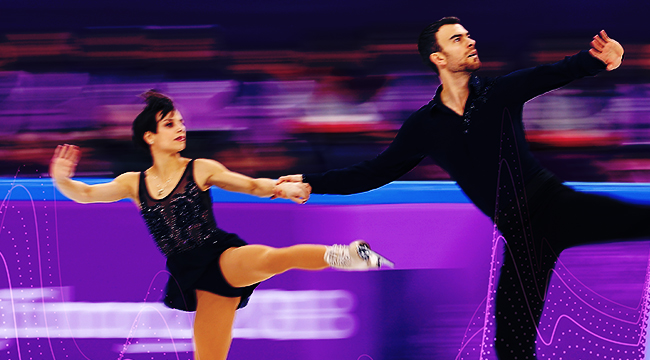
When people realized that figure skaters may perform to music with lyrics for the first time in Olympics competition, critics began to fantasize over the possibilities. One headline summed them up: “’Rhapsody in Blue’ Or Rap?” Jimmy Ma skated to DJ Snake and Lil Jon’s “Turn Down For What” only a month prior at the US National Championships, which added to the excitement even though he ultimately didn’t qualify for Olympic competition. By one calculation, only a fourth of the music would be classical, compared to nearly half during the 2009-2010 season.
Yet, now that this year’s skating competitions have finished, our ideas of Olympic-worthy music seem to have barely changed. Bolder music choices rarely translated to big wins.
Up until 2014 (although, not in time for the Sochi tournament), judges automatically deducted points for music that featured any vocals whatsoever. The International Skaters Union only approved the rule change after a years-long debate, to boost viewership and lasting interest. Still, the actual skaters, coaches and choreographers couldn’t break tradition completely, not with nationalistic pride at stake. This wasn’t an exhibition, where popular music has long been allowed and skaters felt they can cut loose. People argued that classical music lends itself best to the balletic artistry that judges want — that “there is something so regal about skating that might not carry with Top 40.”
In a strategic move, several skaters balanced modern music with the more traditional, Ed Sheeran’s “Shape of You” in one round and Beethoven the next. The biggest win featuring modern music was when Canada’s Meaghan Duhamel and Eric Radford conquered the team free skate with Adele’s “Hometown Glory,” featuring the lyric “Shows that we ain’t gonna stand shit.” In general, softer and slower music became a safe bet, like Luis Fonsi and Daddy Yankee’s “Despacito,” but also when Duhamel and Radford chose a more pained cover of “With or Without You.” (They found the U2 original a bit “monotone.”) Baz Luhrmann’s Moulin Rouge soundtrack was also popular.
Saturday Night Live star Leslie Jones won the Olympics this year with her unapologetic Twitter commentary, as she discovered the joys of hockey and wondered aloud how curling is even a sport. Yet despite her lack in technical expertise, even she realized what qualifies as “Olympic-worthy” skating. “Have you noticed that all the really, really intense, good [skaters], they skate off classical? They don’t mess around with that other shit.” Sure enough, the very skaters she saw on screen, Alina Zagitova and Evgenia Medvedeva, became the contenders to watch.
Medvedeva famously skated to the Sailor Moon theme during last year’s ISU World Team Trophy, hence why Jones would say she was going to “anime land.” But for the Olympics she opted for Chopin, a heartbreaking performance to Dario Marianelli’s “Anna Karenina” — this marked shift in tone.
Shortly after I, Tonya bid for sympathy toward Tonya Harding, who famously skated to ZZ Top to skepticism back in 1992, skater and NBC commentator Johnny Weir called Ivett Toth’s decision to skate to “Back To Black” and “Thunderstruck” a “nightmare.” This critique made this song choice seem like a personal affront. “AC/DC, I get it, people love it,” he said. “I’m not one of those people, and I’m not sure if the entire panel of judges will be an AC/DC head.” The rule change also felt cynical because of how the scoring system clearly favored skaters who attempt quads (Zagitova, Mikhail Kolyada), no matter how messy the result, over those who made memorable statements (Medvedeva, Adam Rippon).
The International Skating Union may have allowed the skaters more artistic freedom in theory. But until we abandon these old notions of artistry, and open ourselves up to new ideas for self-expression, any risks skaters take will continue to cost them.






